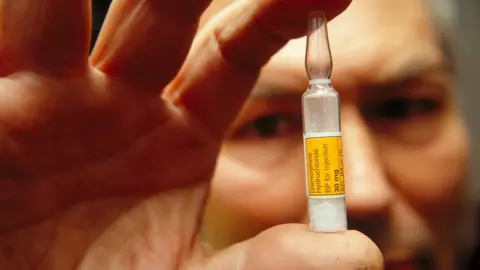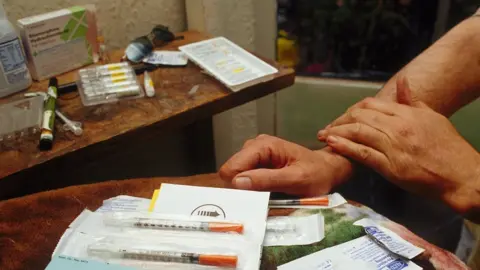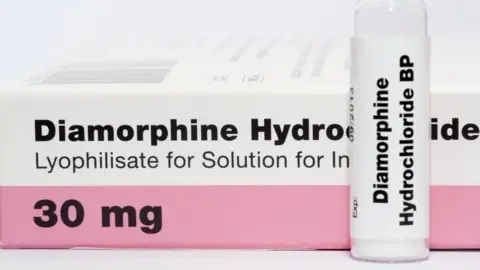Drug workers warn heroin treatment shortage will cost lives
 Getty Images
Getty ImagesAn "unprecedented shortage" of a substitute for illegal heroin in England is putting hundreds of lives at risk, say drug workers.
Diamorphine is a pharmaceutical form of the drug prescribed when methadone and other medications are ineffective.
Former heroin users have told the BBC they have relapsed for the first time in decades as a result of the shortage.
Doctors say the problem is also affecting some end-of-life patients who are given diamorphine for pain relief.
The Department of Health says alternative medications "remain available", while pharmaceutical companies say they are working hard to address supply issues.
Diamorphine hydrochloride is a pure chemical form of heroin prescribed to around 200 former drug users in England who have not responded well to other forms of treatment.
Patients take it at home and are regularly tested to prove they are not buying extra doses of illegal heroin on the black market, which is often contaminated - or cut - with other chemicals and impurities.
Sarah, not her real name, has been injecting several doses of diamorphine a day since first getting help for drug addiction in the 1990s.
"It completely removes any desire to use heroin and stops me from using any illicit drugs whatsoever," she says.
"Diamorphine doesn't sedate me at all so I'm able to function normally and I'm able to work."
Sarah, who is now in her 60s and married with grandchildren, has a job as a senior care worker in south-west England.
She told the BBC that a "total absence" of diamorphine from pharmacies in her area means she has relapsed and started using street heroin for the first time in more than a decade.
"After all that hard work and effort, the stability that I've had for years and years has just gone," she says.
"You are angry for letting yourself do it, especially when you've tried so hard to be away from it all, but you can't stop yourself because any replacement medication is just not as effective."
 Getty Images
Getty ImagesPharmacies have repeatedly warned about "significant shortages" of some key drugs this year, as the pandemic has stretched global supply chains and the price of the precursor chemicals used to make medicines has increased.
Diamorphine is supplied in England by two large generic drug manufacturers: Accord Healthcare and Wockhardt, which are both based in India with British subsidiaries.
The companies confirmed they are out of stock of certain quantities of the treatment, which comes in different-sized ampules or phials.
Accord said the manufacturing process is complex and the problem is not with a shortage of raw materials, but in processing the medication into its final freeze-dried form.
There have been intermittent supply problems with diamorphine for the last four years but drug workers say the current situation in England is "completely unprecedented" with patients left without their regular medication since March.
"This is the worst shortage that I've ever been aware of," says Claire Robbins, nurse advocate and drugs adviser at the charity Release.
"These are patients who have not used street heroin for decades in some cases and there is a real risk that someone is going to die in this current drought."
Accord Healthcare said it is working closely with the government and the medicines regulator, the MHRA, to test and release the next batch of diamorphine as quickly as possible.
Wockhardt said it is addressing supply issues and anticipates that by July "sufficient access to the drug will be restored".
Drug charities warn that swift action is needed at a time when a far stronger, more dangerous form of street heroin cut with the chemical isotonitazene has been detected in parts of the UK.
"We urgently need to secure a stable supply of diamorphine for these patients," says Ms Robbins.
"The UK is currently experiencing the highest rate of drug-related deaths on record. This is a crisis."
Northern Ireland has also been affected by the shortage. In Wales, drug workers say diamorphine is not prescribed in the same way, while in Scotland a different product is shipped from Switzerland, which hasn't suffered from the same supply problems.
 Science Photo Library
Science Photo LibraryDiamorphine is also used as a strong painkiller in hospitals after some types of surgery, or in hospices for end-of-life care.
Doctors say they have struggled to access the medicine, with the situation getting worse over the pandemic.
There are alternative treatments, such as morphine, but they have to be given in much larger quantities to have a similar effect, which is not always medically possible.
"You just can't leave people in extreme pain. It is immoral to do that with a terminal illness," says Dr Amy Proffitt, a hospital consultant and president of the Association of Palliative Medicine.
"Back in May 2020 we were told this was going to get better by the summer. Two years on and we really need someone to get a grip and address this situation."
A spokeswoman for the Department of Health and Social Care said the government was aware of an "ongoing issue with diamorphine injections".
"We want to reassure patients that alternative opioid products, including all forms of morphine, remain available and if they have any concerns, they should speak to their prescriber or pharmacist," she said.
"We are working with suppliers to manage the issue, and with NHS England and national experts on advice for healthcare professionals regarding alternative treatments for affected patients."
You can follow Jim on Twitter.
